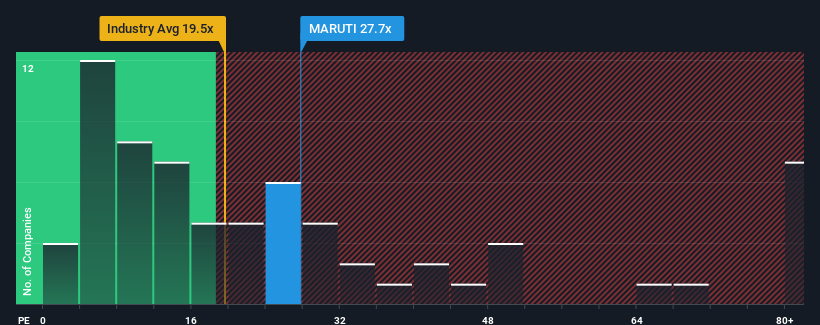Maruti Suzuki India Limited's (NSE:MARUTI) Share Price Could Signal Some Risk

With a median price-to-earnings (or "P/E") ratio of close to 31x in India, you could be forgiven for feeling indifferent about Maruti Suzuki India Limited's (NSE:MARUTI) P/E ratio of 27.7x. However, investors might be overlooking a clear opportunity or potential setback if there is no rational basis for the P/E.
With earnings growth that's superior to most other companies of late, Maruti Suzuki India has been doing relatively well. It might be that many expect the strong earnings performance to wane, which has kept the P/E from rising. If you like the company, you'd be hoping this isn't the case so that you could potentially pick up some stock while it's not quite in favour.
See our latest analysis for Maruti Suzuki India

How Is Maruti Suzuki India's Growth Trending?
In order to justify its P/E ratio, Maruti Suzuki India would need to produce growth that's similar to the market.
Retrospectively, the last year delivered an exceptional 87% gain to the company's bottom line. The strong recent performance means it was also able to grow EPS by 169% in total over the last three years. Accordingly, shareholders would have probably welcomed those medium-term rates of earnings growth.
Shifting to the future, estimates from the analysts covering the company suggest earnings should grow by 10% each year over the next three years. That's shaping up to be materially lower than the 19% per year growth forecast for the broader market.
In light of this, it's curious that Maruti Suzuki India's P/E sits in line with the majority of other companies. It seems most investors are ignoring the fairly limited growth expectations and are willing to pay up for exposure to the stock. Maintaining these prices will be difficult to achieve as this level of earnings growth is likely to weigh down the shares eventually.
The Bottom Line On Maruti Suzuki India's P/E
Typically, we'd caution against reading too much into price-to-earnings ratios when settling on investment decisions, though it can reveal plenty about what other market participants think about the company.
We've established that Maruti Suzuki India currently trades on a higher than expected P/E since its forecast growth is lower than the wider market. Right now we are uncomfortable with the P/E as the predicted future earnings aren't likely to support a more positive sentiment for long. This places shareholders' investments at risk and potential investors in danger of paying an unnecessary premium.
Plus, you should also learn about these 2 warning signs we've spotted with Maruti Suzuki India.
Of course, you might find a fantastic investment by looking at a few good candidates. So take a peek at this free list of companies with a strong growth track record, trading on a low P/E.
New: Manage All Your Stock Portfolios in One Place
We've created the ultimate portfolio companion for stock investors, and it's free.
• Connect an unlimited number of Portfolios and see your total in one currency
• Be alerted to new Warning Signs or Risks via email or mobile
• Track the Fair Value of your stocks
Have feedback on this article? Concerned about the content? Get in touch with us directly. Alternatively, email editorial-team (at) simplywallst.com.
This article by Simply Wall St is general in nature. We provide commentary based on historical data and analyst forecasts only using an unbiased methodology and our articles are not intended to be financial advice. It does not constitute a recommendation to buy or sell any stock, and does not take account of your objectives, or your financial situation. We aim to bring you long-term focused analysis driven by fundamental data. Note that our analysis may not factor in the latest price-sensitive company announcements or qualitative material. Simply Wall St has no position in any stocks mentioned.
About NSEI:MARUTI
Maruti Suzuki India
Engages in the manufacture, purchase, and sale of motor vehicles, components, and spare parts primarily in India.
Excellent balance sheet average dividend payer.


